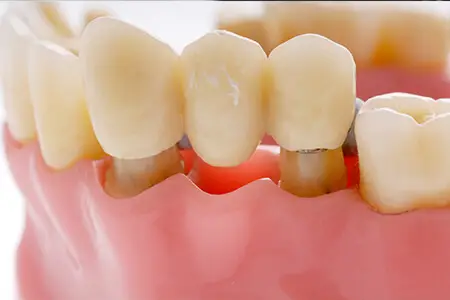Dental bridges are fixed prosthetic devices used by the dentist in Eagle Grove, IA, to replace one or more missing teeth by bridging the gap between adjacent natural teeth or dental implants. Typically made of porcelain, ceramic, or a combination of materials, dental bridges are custom designed to match the natural teeth's color, shape, and size for a seamless appearance.
By filling in the space left by missing teeth, dental bridges restore oral function, improve chewing and speaking abilities, prevent adjacent teeth from shifting out of alignment, and enhance overall facial aesthetics. Additionally, dental bridges can help distribute bite forces evenly across the dental arch, reducing the risk of temporomandibular joint (TMJ) disorders and promoting long-term oral health.

Who Is a Suitable Candidate for Dental Bridges?
If you’re considering dental bridges as a solution for missing teeth, you have to have the following:
Good Oral Health
Suitable candidates for dental bridges typically have a foundation of good oral health. This means they have healthy teeth and gums without gum disease, decay, or infection. Before receiving a dental bridge, patients need to undergo a comprehensive dental examination to ensure that their oral health is in optimal condition. If any underlying dental issues are present, they may need to be addressed before proceeding with the placement of a dental bridge.
Adequate Tooth Structure
Dental bridges rely on adjacent teeth for support, so candidates must have adequate tooth structure surrounding the gap left by the missing tooth or teeth. The adjacent teeth should be strong enough to support the dental bridge without compromising their integrity. In some cases, if the adjacent teeth are weakened or compromised, additional dental treatments such as crowns or root canal therapy may be necessary to strengthen them before a dental bridge can be placed. Contact us today!
Sufficient Bone Density
Another consideration for candidacy is sufficient bone density in the jawbone to support the dental bridge. Our dentist at Moffitt Dental typically anchors the dental bridge to the adjacent teeth or dental implants, which requires a stable foundation of bone for support. If the patient has experienced significant bone loss in the jaw due to tooth loss or other factors, bone grafting may be necessary to augment the bone volume and create a stable base for the dental bridge.
Commitment to Oral Hygiene
Suitable candidates for dental bridges are committed to maintaining good oral hygiene habits, including regular brushing, flossing, and routine dental checkups. Proper oral hygiene is essential for the longevity of dental bridges and helps prevent complications such as tooth decay, gum disease, and damage to the supporting teeth. Patients must be willing to follow our dentist's instructions for caring for and maintaining their dental bridge to ensure its success and longevity.
The Benefits of Dental Bridges
Restored Oral Function
One of the primary benefits of dental bridges is the restoration of oral function. Missing teeth can make it difficult to chew food properly and may affect speech. Dental bridges in Eagle Grove, IA, fill in the gap left by missing teeth, allowing for improved chewing efficiency and speech clarity. With a dental bridge in place, patients can enjoy a varied diet and speak confidently without worrying about the limitations associated with missing teeth.
Prevents Shifting of Adjacent Teeth
When a tooth is lost, the adjacent teeth shift or drift into the space over time. This can lead to misalignment of the teeth, bite problems, and even further tooth loss. Dental bridges help prevent this shifting by filling the gap and stabilizing the surrounding teeth. By maintaining proper tooth alignment, dental bridges contribute to the overall health and longevity of the smile.
Enhanced Aesthetics
Dental bridges are custom designed to blend seamlessly with the natural teeth, resulting in a smile that looks and feels natural. The prosthetic teeth used in dental bridges are carefully crafted to match the surrounding teeth's color, shape, and size, ensuring a harmonious and aesthetically pleasing appearance. With dental bridges, patients can regain confidence in their smile and feel proud to show it off in social and professional settings.
Long-Term Durability
Modern dental bridges are made from durable materials such as porcelain or ceramic, known for their strength and longevity. Dental bridges can last many years with proper care and maintenance, providing patients with a reliable and long-term solution for missing teeth. Unlike removable dentures, which may require periodic adjustments or replacements, dental bridges offer a permanent and fixed restoration that can withstand the rigors of daily use.
Preservation of Oral Health
Dental bridges help preserve the health and integrity of the remaining natural teeth by distributing bite forces evenly across the dental arch. By filling in the gap left by missing teeth, dental bridges prevent excessive stress on the adjacent teeth and reduce the risk of dental issues such as tooth decay, gum disease, and temporomandibular joint (TMJ) disorders. Dental bridges promote proper jaw alignment and facial symmetry, contributing to overall oral health and well-being.
Whether you're missing one or several teeth, dental bridges provide a reliable and effective solution for restoring your smile and improving your quality of life. If you're considering dental bridges, visit Moffitt Dental at 322 S Commercial Ave, Eagle Grove, IA 50533, or call (515) 448-4852 to determine if you're a suitable candidate for this treatment option.